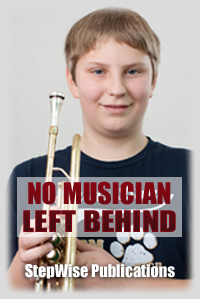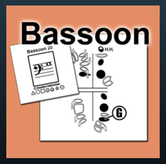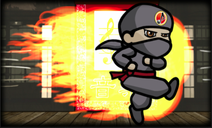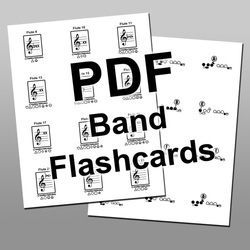 Having taught band for 17 years, I am very aware of the tendency for SOME beginning band and orchestra students to get overwhelmed with note reading after getting to the 4th, 5th, and 6th notes. I have seen this happen every year around the 3rd month of school. As I continue to lead my classes through the method book, teaching new notes and concepts day after day, hoping that everyone is building a comprehensive understanding of music notation, some of my students begin a secret struggle to keep up with the rest of the class. How Some Begin to Slip I don't notice which students are falling behind at first, because kids don't tend to raise their hands and say, "Mr. Winters, I feel stupid right now, and I am getting totally lost!". Instead they revert to various coping mechanisms, such as trying to play by ear or watching the fingerings of students around them. At the same time they stop focusing on building logical schemata for how their fingerings are organized, because they don't feel like there is any comprehensible order to all the lines, spaces, and accidentals they see, and the keys they press, or fingers they place, or positions they move their slides to. They come to believe that our system of music notation and correlating fingerings is a jumbled mess of unconnected factoids that are impossible to memorize. When they refer to the fingering chart in the back of the method book they can find each note's fingering, but not a way to organize the hundreds of bits of information so it can be easily memorized. After teaching for several years I finally noticed this pattern of "losing" a small percentage of young musicians by the 3rd month, and I became obsessive about figuring out how I could teach so that no musician was left behind! Early Strategies At first I focused more on my delivery as a teacher. "Perhaps I need to be more entertaining", I thought. So I enthusiastically began a grand "Crusade of Funniness", which was really a continuation of my original classroom management plan. Not a very good plan, I now realize! I was really quite good at being the most entertaining person in the room most of the time. However, that strategy did not result in higher dividends of student learning/prevention of student failing. "I need to get the students more engaged by using a variety of teaching strategies", I thought. This meant I could use the white board more, and even bring students to the white board. Ooh! I could show educational videos, or use my Elmo device to show things on my projector screen. I could ask more questions and have students explain concepts to each other. Wow! Yes, all of those strategies are good...really good...but were still insufficient to prevent the terrible loss of many well-meaning but hopelessly confused students during the 2nd term. Two Steps to Achieving Zero Loss It took me a few additional years to realize that two critical steps to overcoming this problem were to 1) provide better educational materials (just using the method book was not sufficient), and 2) assess each student through both written and playing tests more frequently. These steps required more time and/or money. They required an iron will to do that which is not easy or natural for me. They demanded that I act more like a "core" teacher and less like an "arts" teacher. The overall cost seemed heavier than I was previously willing to pay, but finally I had come to the point where I was willing to pay it.  1-Better Educational Materials After searching for materials I could use to better instruct my students in the most basic essentials of note reading I found nothing that met my OCD perfectionistic standards. So, I did what any self-respecting band director would do and spent all summer (twice) developing them! The drive to help every one of my students succeed pushed me to create the ultimate set of note & fingering flashcards for every band & orchestra instrument, as well as fingering charts that convey more critical stuff to beginners (like partials for brass and matching octave-fingerings for woodwinds). I also established StepWise Publications as a way to share my most effective materials with the music education community. The flashcards did make a huge impact, and made it possible for me to assess any student on any range of notes at any time within seconds. Mere SECONDS! However, even with weekly work with the flashcards there were still a few students who just did not catch on or develop consistently accurate or speedy recall of the note names or fingerings. After I'd been using the flashcards for about two years a good friend of mine started to bug me about the need to gamify the flashcards into an app. Well, it just so happens that I have a brother who is a programmer and who was crazy enough to partner with me in making a band/orchestra fingering flashcard app. Within a year NinGenius Music was born! And WOW what a difference it has made! Those last few struggling students have been able to keep up and sometimes overtake the "herd" because of the ability to practice their notes and fingerings over and over on their own using a fun, motivating game.  2-Regular Assessment One of my core beliefs about assessment, which I expect many teachers to disagree with, is that all playing tests and grading of written & playing tests must occur during regular class time. I feel this way for several reasons. First, I am not willing to sacrifice family time on a regular basis for my job...period. I was hired and receive a salary for X number of hours per week, and I am simply unwilling to put in more time than is required. If my principal disagrees with this philosophy then he can fire me for "doing my job well within my 7:45 - 3:55 workday". So, yes, I sacrifice some classroom instructional time regularly to do assessment, just like all the other teachers in the school, and I LOVE IT...but I also hate it. I love hearing individual students play so I can provide specific, instant feedback and be aware of problems and tendencies throughout my bands and orchestras. There is no substitute for taking time to do this! I also love seeing my students eventually "get it" and demonstrate proficiency more than once. However, I hate taking time away from other musical activities, and I hate doing the same worksheets over and over. Again, there is no substitute for repetition of concepts if we want our students to master essential musical concepts and develop greater recall speed. Current Strategies
My current list of strategies for leaving no musician behind is: 1) Pass out StepWise Fingering Charts within the first week, and refer to them regularly. 2) Pass out StepWise Flashcards within the first week, and begin using them daily - starting with the first three notes (cards 15, 16, and 18 for all instruments). 3) Get students playing the NinGenius Music iPad app as soon as they have learned their first 5 notes. 4) Assess students' playing abilities with short excerpts, sight reading, etc. at least twice per month. As a music teacher I LOVE seeing every student actively engaged in learning activities at the same time. Providing every student with a set of StepWise Flashcards has made this educational ideal easy to achieve. EVERY single student within the wide spectrum of current ability, is able to engage in meaningful and motivational learning activities with these flashcards using only a small part of my rehearsal time. Every musician is learning, improving, and mastering their essential knowledge of their instrument at the same time. BAM! It is amazing! Summary/Conclusion I hate leaving any student in the dust as we push through page after page of the method book. I believe that the truest measure of my success as a band teacher is if I can help EVERY student in my beginning classes learn to read and finger the notes in the method book within the first year. For me, in my small Title 1 school, it was never possible to succeed in that way...NEVER, until I started using the StepWise Flashcards. Access to the NinGenius Music app has made it even easier to achieve this kind of success! Have you found other ways to engage students in learning and mastering their notes and fingerings? Please share in a comment below!
1 Comment
|
Author
Curtis Winters has taught band, orchestra, and jazz band at a small Title 1 junior high school in Orem, UT for 18 years. Archives
May 2018
Categories
|
|
StepWise Publications
896 W 2370 N Provo, UT 84604 curtis@stepwisepublications.com |



 RSS Feed
RSS Feed

